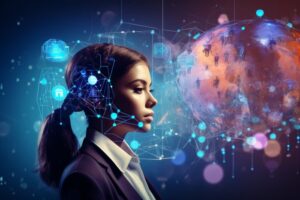
AI for creating learning content is revolutionizing the educational landscape, reshaping how we develop and deliver educational materials. As technology continues to evolve, the integration of AI tools offers unprecedented opportunities for educators to enhance learning experiences and engage students more effectively.
Through personalized learning pathways and innovative applications, AI is paving the way for a future where educational resources are not only more accessible but also tailored to the needs of individual learners. The shift from traditional content creation methods to AI-driven approaches is proving to be a game changer in the classroom.
The Role of AI in Learning Content Creation
The integration of artificial intelligence (AI) in education has revolutionized the way learning content is created and delivered. AI tools are not just enhancing the efficiency of content generation; they are also reshaping the educational landscape to cater to diverse learning styles and needs. This transformation is not merely a trend but a significant evolution in how we approach teaching and learning.AI tools can enhance the process of creating educational materials by automating routine tasks and providing intelligent insights.
For instance, AI algorithms can analyze vast amounts of data to identify the most effective teaching strategies and content formats. This capability allows educators to focus on higher-level tasks, such as developing engaging lesson plans or facilitating interactive learning experiences. Moreover, AI can assist in generating quizzes, assignments, and even full courses tailored to specific learning outcomes. Tools like automated writing assistants can help instructors refine their content to ensure clarity and accessibility, enabling a broader range of learners to benefit from the materials.
Personalized Learning Experiences
Personalization in education is paramount, and AI plays a crucial role in tailoring learning experiences to individual student needs. With the ability to analyze student performance data in real-time, AI systems can adapt content to suit varying levels of comprehension and learning speeds. This not only enhances student engagement but also improves retention of knowledge. To illustrate, consider a scenario where an AI platform monitors a student’s progress in mathematics.
If it identifies that the student struggles with fractions but excels in geometry, the system can provide additional resources and exercises focused on fractions while allowing the student to advance in geometry. This targeted approach fosters a more effective learning environment.The contrast between traditional content creation methods and AI-driven approaches is stark. Traditional methods often rely heavily on static content that does not evolve based on student feedback or performance.
In contrast, AI-driven content is dynamic, continuously adapting to the learner’s journey. The benefits of AI in learning content creation can be summarized as follows:
- Efficiency: Reducing the time educators spend on administrative tasks and content generation.
- Adaptability: Providing real-time adjustments to learning materials based on student performance data.
- Accessibility: Ensuring that educational content is available in various formats, accommodating students with different learning preferences.
- Engagement: Enhancing interactivity and involvement through personalized learning experiences that keep students motivated.
By leveraging AI, educators can focus on what matters most—connecting with their students and nurturing their growth. The ability of AI to analyze patterns and predict learning outcomes empowers teachers to create a more impactful educational experience that is responsive to the needs of each individual learner.
Innovative AI Applications in Education

In recent years, the integration of Artificial Intelligence (AI) into educational settings has transformed the landscape of learning content creation. Various AI applications have surfaced, offering innovative solutions that enhance the quality and accessibility of educational materials. With a focus on personalized learning experiences and efficient resource management, these technologies are reshaping how educators and learners interact with knowledge.AI’s role in preserving educational resources and materials is significant, as it not only safeguards valuable content but also enhances its discoverability and usability.
By employing AI-powered tools, educators can ensure that learning materials remain relevant and accessible to diverse learner populations. This preservation of educational resources fosters a more inclusive and equitable learning environment, where knowledge can be disseminated widely and effectively.
Current AI Applications in Learning Content Development
A variety of AI applications are currently being utilized in the development of learning content, each designed to streamline processes and improve educational outcomes. The following table Artikels different AI tools for educators, comparing their features and functionalities:
| AI Tool | Key Features | Target Audience | Benefits |
|---|---|---|---|
| OpenAI GPT | Natural language processing, content generation | Educators, content creators | Quick content development, diverse topic coverage |
| Kahoot! | Interactive quizzes, gamification | Students, teachers | Engaging learning experiences, real-time feedback |
| Duolingo | Personalized language learning, AI-driven exercises | Language learners | Adaptable learning pace, extensive resource library |
| Edmodo | Collaborative learning platform, resource sharing | Teachers, students | Enhanced communication, centralized resources |
| Quizlet | Study sets, flashcards, game-based learning | Students, educators | Flexible study options, peer collaboration |
These tools exemplify how AI enhances learning content creation by providing personalized, interactive, and engaging educational experiences. By leveraging such technologies, educators are better equipped to meet the diverse needs of their students, ultimately fostering a more enriched learning environment.
Future Trends of AI in Education
The landscape of education is poised to undergo significant transformation over the next decade, largely driven by advancements in artificial intelligence (AI). As AI technologies continue to mature, they will reshape how learning content is created, delivered, and consumed. This evolution promises to enhance personalized learning experiences, streamline content generation, and provide deeper insights into student performance, fostering a more adaptive educational environment.One of the key areas where AI will impact education is in the ongoing evolution of learning content creation.
Predictions indicate that AI will facilitate the development of highly tailored educational materials that cater to individual learning styles and paces. For instance, AI-driven platforms like Knewton and Carnegie Learning are already demonstrating the potential of adaptive learning technologies that respond to students’ needs in real-time. Over the next decade, we can anticipate an increased reliance on automated content creation tools that utilize natural language processing and machine learning algorithms to develop interactive and engaging learning resources, reducing the workload on educators while enhancing the overall quality of materials available.
Roadmap for Integrating AI Technologies
Integrating AI technologies into existing educational frameworks requires a strategic approach. This roadmap Artikels essential steps for effective implementation:
1. Assessment of Current Infrastructure
Evaluate existing educational technologies and systems for compatibility with AI solutions.
2. Stakeholder Engagement
Collaborate with educators, students, and administrators to gather insights and foster buy-in for AI initiatives.
3. Pilot Programs
Implement AI tools on a small scale to test efficacy and gather feedback before broader deployment.
4. Professional Development
Provide training for educators to effectively use AI tools and understand their benefits in the classroom.
5. Continuous Evaluation
Establish metrics for assessing the impact of AI on learning outcomes, making adjustments based on data and feedback.The roadmap emphasizes that a thoughtful and phased approach can facilitate smoother transitions while maximizing the advantages of AI technologies.
Challenges and Solutions Related to AI Implementation
While the integration of AI in education offers promising opportunities, it also presents certain challenges that need to be addressed. Recognizing these hurdles can lead to effective solutions. Key challenges include:
Data Privacy Concerns
Safeguarding student data is paramount in AI applications. Schools must implement robust data protection policies and ensure compliance with regulations such as GDPR or FERPA.
Equity in Access
There is a risk that AI may inadvertently widen the digital divide. Ensuring equitable access to AI tools is essential, requiring investments in infrastructure and training for underserved communities.
Resistance to Change
Educators and institutions may resist adopting new technologies. Addressing this requires transparent communication about the benefits of AI and involving educators in the decision-making process.
Quality Assurance
The need for high-quality AI-generated content is critical. Continuous monitoring and evaluation mechanisms should be put in place to ensure educational materials meet established standards.By proactively addressing these challenges, educators and policymakers can harness the power of AI to create a more dynamic and inclusive educational landscape.
Closing Summary

In conclusion, the role of AI in creating learning content is expanding rapidly, and its potential to transform education is immense. By embracing these technological advancements, educators can ensure that they are adequately equipped to meet the diverse needs of their students, fostering an environment of continuous improvement and engagement.
Commonly Asked Questions
What are the primary benefits of using AI in educational content creation?
AI enhances efficiency, personalization, and adaptability of learning materials, making them more engaging for students.
How does AI personalize learning experiences?
AI analyzes student data to tailor content based on individual learning styles, preferences, and progress.
Are there any challenges in implementing AI in education?
Yes, challenges include data privacy concerns, the need for teacher training, and potential resistance to technology adoption.
What types of AI tools are commonly used in education?
Common tools include adaptive learning platforms, AI tutors, content generation tools, and data analytics software.
How will AI shape the future of learning content creation?
AI will enable more dynamic, interactive, and personalized learning experiences, making education more effective and accessible.




